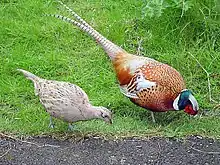faisan
French

faisans (mâle et femelle)
Etymology
Inherited from Middle French faisan, from Old French faisan, from Latin phāsiānus, from Ancient Greek φασιανός (phasianós).
Pronunciation
- IPA(key): /fə.zɑ̃/
faisan (file)
Noun
faisan m (plural faisans, feminine faisane or faisande)
- pheasant (a bird of family Phasianidae)
- cock pheasant (male pheasant)
Synonyms
(male pheasant)
- coq faisan
- faisan mâle
- mâle du faisan
Derived terms
- faisandeau (“young pheasant”)
Descendants
- → Romanian: fazan
Further reading
- “faisan”, in Trésor de la langue française informatisé [Digitized Treasury of the French Language], 2012.
Middle French
Etymology
Inherited from Old French faisan, from Latin phāsiānus, from Ancient Greek φασιανός (phasianós).
Occitan
Pronunciation
- IPA(key): /ˈfajˈza/
Old French
_male.jpg.webp)
Li faisans
Alternative forms
- faisant, faisen, feisan, feisant, fesan
- feisaun, fesaun, fesaunt (Anglo-Norman)
Etymology
Inherited from Latin phāsiānus, from Ancient Greek φασιανός (phasianós).
The expected from would be *faisain, *feisain; the form in -an is probably influenced by Old Occitan faisan or by the word's Latin etymon.
Pronunciation
- IPA(key): /fai̯ˈzan/, /fəˈzan/
Noun
faisan oblique singular, m (oblique plural faisans, nominative singular faisans, nominative plural faisan)
This article is issued from Wiktionary. The text is licensed under Creative Commons - Attribution - Sharealike. Additional terms may apply for the media files.